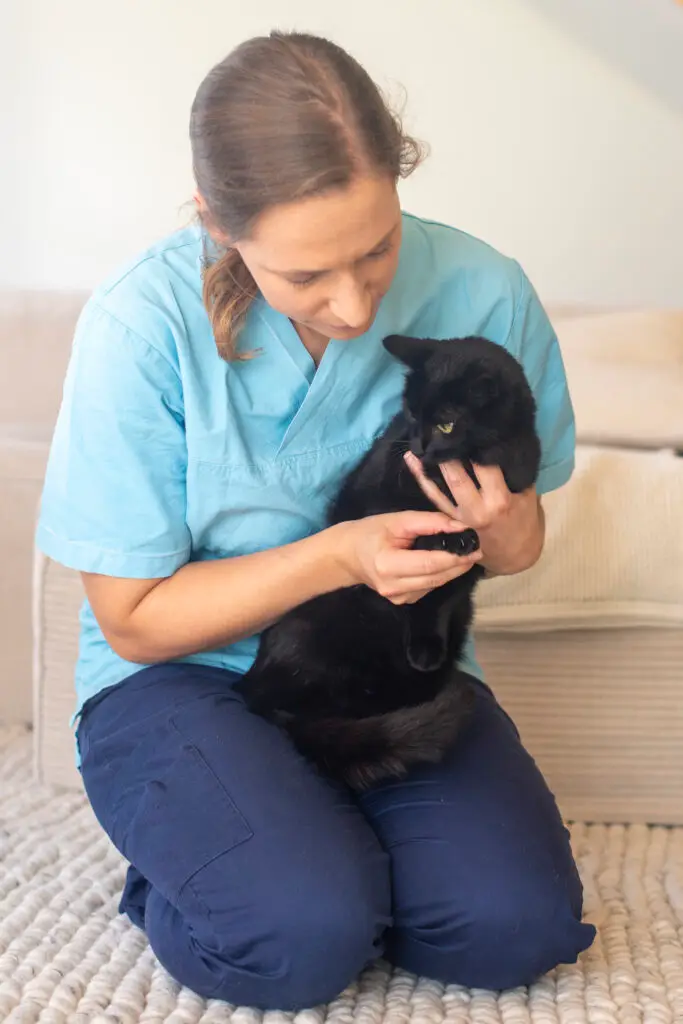
Veterinarian
for your cat
As a mobile veterinarian, I treat your cat in its own trusted environment, within the comfort of your home. This leads to less stress for you and for your cat, as there is no need for transportation and no encounters with dogs in a practice waiting room. As over 80% of my clients are feline patients, I am particularly trained in the needs of these beautiful animals. I take continuing education courses in cat medicine every year, with a focus on geriatrics (the needs of old cats, i.e. senior cats).
FAQs on cat health
Do I have to vaccinate my indoor-only cat?
Some Vaccines are also recommended for indoor-only cats. However, the frequency of booster vaccinations is of course much lower due to the lower risk of infection. If indoor cats have no contact with other cats (as they would in an outdoor enclosure or in a cat hotel), one vaccination every 2-3 years is usually sufficient after the basic immunisation has taken place. However, a health check at least once per year is recommended so that any illnesses can be detected and treated at an early stage.
When should my cat see a veterinarian?
An annual health check makes sense for all cats. Other reasons for a visit to the vet include a reduced or completely absent appetite, frequent vomiting, diarrhea or constipation, as well as signs of pain or discomfort. Cats are masters at hiding their pain. Behavioral changes such as sleeping more often, withdrawing, or sudden aggressive behavior towards people and other cats are often due to health issues. Contact me if you'd like to discuss your cats symptoms. I'm happy to advise.
Does a tick bite require a vet visit?
If you find a tick on your cat, you should remove it as soon as possible (more information on this here). You can then disinfect the area with a disinfectant (e.g. diluted Betadine, Octenisept). Usually, no follow-up treatment is required. Even stuck parasite parts can normally be removed by the body itself over the course of a few days. The transmission of diseases from ticks to cats is currently very rare in our area. If you notice fever or other symptoms in your cat, contact me right away.
What are the symptoms of cat flu/cat cold?
The cat cold usually affects the upper respiratory tract and is mostly manifested by sneezing and breathing noises. This can be accompanied by eye symptoms (closed, watery, or pus-filled eyes) and a general lack of appetite and apathy. Sometimes the viruses can cause only eye symptoms.
If your cat is not eating or its general condition is poor, you should definitely consult a veterinarian as soon as possible. Inhalation therapy can help in the meantime. To do this, place the cat in a closed cat carrier, put a bowl of hot water in front of it (out of paw reach!) and cover the bowl and carrier with a large towel. Alternatively, simply take the cat into the bathroom (not into the shower! ;)) when you take a shower and let the water run extra long and hot.
Incidentally, cat flu / cold is contagious and an affected cat should be separated from its fellow cats.
Is there a vaccine against cat cold / cat flu?
Cat flu can be caused by a variety of bacteria and viruses (often in combination with each other). Vaccination is currently possible against herpes and caliciviruses and is also recommended for all cats. Vaccination does not protect against infection, but against a severe course of the disease.
I'm happy to advise you on your cat's individual situation. Contact me anytime.
My cat has diarrhoea. What should I do?
Acute diarrhea (1-3 days, without further symptoms, with normal appetite and normal general condition) can be observed for the time being and, if necessary, supported with a probiotic. Also remember to deworm regularly.
If the diarrhea lasts longer or your cat shows other symptoms such as vomiting, apathy or loss of appetite, a vet visit should be planned as soon as possible. Contact me if required.
My senior cat has a decreased appetit and sleeps a lot. Do I need to do something?
It is dangerous to assume that a senior cat that sleeps a lot and has less appetite is “just getting old”. There are often health problems behind these behaviours, such as arthritis-related pain or kidney or thyroid disease. A veterinary visit should be planned as soon as possible.
What are the symptoms of dementia in cats?
Cognitive dysfunction (colloquially known as dementia) in cats often manifests itself in changes of character, e.g. withdrawal, loud meowing (often at night), sudden aggressive behavior towards people or other animals in the household, confusion and “staring into space”. Affected cats are often unable to rest at night and cry out loudly for their owners. They may forget to eat or not find the litter tray in time.
Dementia in cats cannot be cured, but its progression can be slowed, and the symptoms can often be controlled with good management to the extent that living with your cat becomes more enjoyable again. We look at these topics in a geriatric consult.
Can senior cats suffer from arthritis?
Yes, in cats over the age of 12, as many as 90% are affected by osteoarthritis, but often younger cats from the age of 8 also suffer from it. Osteoarthritis in cats is often missed for a long time as they are good at hiding their symptoms. The first thing owners usually notice is a change in climbing stairs (one step at a time) or that the cat can no longer jump onto the sofa or reach the high scratching post. The earlier the treatment of osteoarthritis begins, the better quality of life your cat will have and the longer the progression of the disease can be halted. So contact me early for a consult in Geriatric medicine.
How do you know when it's time to euthanize your cat?
Unfortunately, there is no general answer to this question. It is often assumed that the cat must be doing well enough if it is still eating. However, this is definitely not the case for all cats. In addition, the time of euthanasia is a very individual decision and can be dependent on many factors. I'm happy to advise you in your particular situation.
